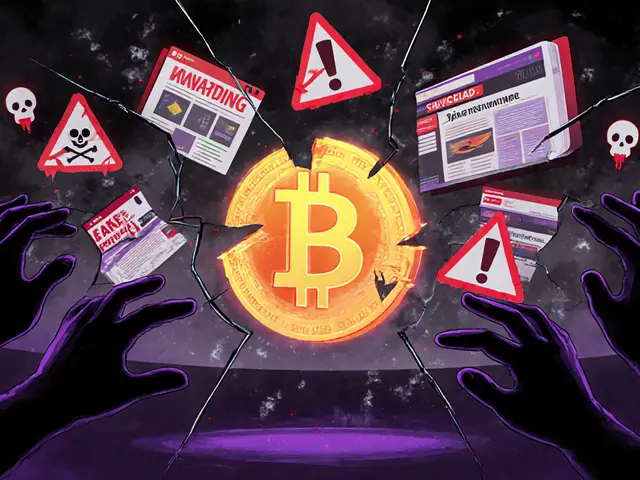Turkey Crypto Payment Feasibility Checker
Transaction Verification Tool
Check if your crypto transaction would require identity verification under Turkey's 2024 regulations (transaction limit: 15,000 TL / $425 USD)
On April 30, 2021, Turkey made a move that shocked the global crypto community: it banned the use of cryptocurrencies for payments. Not trading. Not holding. Just paying with Bitcoin, Ethereum, or any other digital asset. If you wanted to buy coffee, pay your rent, or order food online, you couldn’t use crypto-even if the merchant was willing. But you could still buy and sell it freely. This wasn’t a full ban. It was a targeted strike. And it’s still in force today.
Why Did Turkey Ban Crypto Payments?
The Central Bank of the Republic of Turkey (CBRT) didn’t act out of fear. They laid out five clear reasons in their official announcement:- Cryptoassets have no central regulator-no one to turn to if something goes wrong.
- Prices swing wildly. One day you have $10,000 in Bitcoin; the next, $7,000.
- Transactions are anonymous. That makes them perfect for money laundering and fraud.
- Wallets can be stolen. And once they are, there’s no way to reverse the transaction.
- Payments are final. No chargebacks. No refunds. No safety net.
These weren’t theoretical concerns. They were real risks to Turkey’s financial system. The country had already seen a surge in crypto adoption-partly because of high inflation and a weakening lira. People were turning to Bitcoin and stablecoins like USDT to protect their savings. But when merchants started accepting crypto for goods, the CBRT saw a problem: everyday transactions could become unstable, unpredictable, and untraceable.
What Was Actually Banned?
The rule was simple: no crypto as payment. That meant:- Stores couldn’t accept Bitcoin for groceries.
- E-commerce sites couldn’t let you pay with Ethereum at checkout.
- Payment processors like Papara or QIWI couldn’t route crypto transactions.
- Businesses couldn’t use crypto to pay suppliers or employees.
But here’s the twist: you could still buy, sell, hold, and transfer crypto. Exchanges like Binance Turkey and Paribu kept operating. People could trade 24/7. Wallets still worked. The ban only cut one path: using crypto as money in daily life.
This made Turkey’s approach unique. China banned everything. El Salvador made Bitcoin legal tender. Turkey did something in between: let people trade, but not spend.
How Did People React?
Turkish citizens didn’t stop using crypto-they just got creative.By 2023, nearly 1 in 5 Turks (19.3%) were actively using cryptocurrencies, according to surveys cited by MiTrade. That’s up 11 times from 2020. But most of that activity was trading, not spending. People bought crypto to hedge against inflation, then sold it for Turkish lira to pay their bills.
Reddit threads in r/CryptoTurkey are full of complaints like: “I can trade freely but can’t use my USDT to pay for dinner-that’s the Turkish crypto paradox.” Trustpilot reviews for Binance Turkey average 3.8/5. The top complaint? “Great for trading. Useless for payments.”
Businesses, meanwhile, stayed away. A 2024 Turkish Statistical Institute (TÜİK) survey found only 2% of Turkish companies accepted crypto payments. Compare that to Georgia-right next door-where 14% of businesses do. The difference? Georgia lets you pay with crypto. Turkey doesn’t.

The Rules Got Tighter-Here’s What Changed After 2021
The 2021 ban was just the start. In 2024, Turkey added layers of control.In July 2024, the Law on Amendments to the Capital Markets Law came into effect. Now, every crypto exchange, wallet provider, or custodian serving Turkish users must get a license from the Turkish Capital Markets Board (CMB). The cost? At least 150 million Turkish lira ($4.1 million) for exchanges. Custodians need 500 million lira ($13.7 million).
That’s not just a fee-it’s a barrier. Most small platforms shut down. Only big players like Binance, Paribu, and Bitci stayed. The CMB also started blocking unlicensed platforms. In March 2025, they shut down 46 DeFi platforms, including PancakeSwap, for operating without local registration.
Then came the AML rules. On December 25, 2024, Turkey published new anti-money laundering rules in the Official Gazette. Effective February 25, 2025, any crypto transaction over 15,000 lira ($425) requires full identity verification. If you send crypto from an unregistered wallet? It gets flagged. Suspicious transfers can be frozen.
Exchanges now need:
- Dedicated risk teams monitoring every transaction
- Systems that flag unregistered wallet addresses
- Records of every canceled or failed transaction
- Procedures to cut off users who don’t comply
Deloitte Turkey reported that compliance staffing at major exchanges jumped 30-40% after these rules. It’s not just about security-it’s about control.
Who’s Fighting Back?
Not everyone agrees with the ban. Sima Baktaş, founding partner of Turkish law firm GlobalB, is taking the government to court. Her case, scheduled for May 28, 2025, argues that the payment ban is hurting Turkey’s economy.Baktaş says lifting the ban would:
- Make payments faster and cheaper
- Attract blockchain startups to Turkey
- Boost financial innovation
She points to data: 19.3% of Turks use crypto. That’s millions of people already in the system. Why block them from using it where it works best-paying for things?
Her argument isn’t theoretical. Countries like the U.S., Germany, and Japan let you pay with crypto. Turkey’s ban doesn’t stop adoption-it just pushes it underground. People still buy crypto. They just can’t use it at the grocery store.

What’s the Real Impact Today?
The crypto market in Turkey is still massive. Finance Magnates estimated its value at $170 billion in December 2024. But it’s a market built on speculation, not spending.People use crypto like a savings account-not a debit card. They buy when the lira drops. They sell when they need cash. The ban didn’t kill crypto. It turned it into a hedge, not a payment tool.
Businesses avoid it. Banks don’t support it. Even tech startups that want to accept crypto can’t. The only winners are the exchanges-and the regulators.
What’s Next?
The May 2025 court case could change everything. If Baktaş wins, the payment ban could be lifted-or at least rewritten. If she loses, Turkey will likely double down: more licensing, more tracking, more control.One thing is clear: Turkey isn’t trying to ban crypto. It’s trying to control it. The government wants to keep the money flowing through its banks, not through decentralized wallets. It wants to know who’s buying what, when, and why.
For now, the rule stays: you can trade crypto. You can hold it. You can even send it to a friend. But you can’t use it to buy anything. And until that changes, Turkey’s crypto scene will remain a paradox: the most active market in the region, but one where the money can’t actually be spent.







imoleayo adebiyi
November 28, 2025 AT 09:59It's wild how Turkey treats crypto like a dangerous drug you can hold but not touch. I get the inflation fears, but banning payments feels like trying to stop people from breathing by only blocking their mouths. They're not stopping adoption-they're just making it weirder.
People still use it. They just do it in the shadows. And honestly? That's worse for regulation. At least if it's out in the open, you can track it.
Imagine if your bank said you could trade stocks but couldn't use them to pay for groceries. You'd think they're broken, not protecting you.
I'm from Nigeria-we've got our own crypto chaos, but at least we let people use it. Turkey's policy feels like a control freak's dream.
It's not about security. It's about power. And that's the real danger here.
Also, 19.3% of Turks using crypto? That's not a trend. That's a revolution they're trying to cage.
Kinda sad, really.
Angel RYAN
November 29, 2025 AT 17:33So they let you trade but not spend? That’s like letting someone own a car but not drive it.
Feels more like a psychological trick than a policy. People buy crypto to protect their savings, then sell it to buy bread. The system still works-it’s just extra steps and extra fees.
Meanwhile, Georgia’s over there eating Turkey’s lunch with actual crypto adoption.
Why not just let people decide? If they wanna use USDT for coffee, let ‘em. If it blows up, they’ll learn. Not everyone needs a nanny state.
stephen bullard
November 30, 2025 AT 07:15There’s a deep irony here. Turkey’s banning crypto payments because they’re unstable, anonymous, and irreversible-but their own currency, the lira, is collapsing faster than any altcoin.
People aren’t using Bitcoin to buy pizza. They’re using it to survive.
The Central Bank is terrified of losing control, but they’re ignoring the real problem: inflation is the true rogue asset.
What’s more chaotic? A decentralized network where you can send value across borders in seconds, or a national currency that loses 50% of its value in a year?
It’s like banning fire because someone once burned their toast.
The real question isn’t whether crypto is risky-it’s whether the government is more dangerous than the market.
And if you’re banning payments to protect citizens… why not ban credit cards too? They’re just as irreversible. Just as unregulated. Just as anonymous in the wrong hands.
Maybe it’s not about safety. Maybe it’s about keeping people dependent.
That’s the real policy here.
And I’m not sure which is worse: the ban… or the silence around it.
SHASHI SHEKHAR
November 30, 2025 AT 20:05Broooooo 😭😭😭 Turkey’s crypto policy is like a dad who says ‘you can have the Xbox but you can’t play it’ 😂
19.3% of Turks using crypto? That’s not a blip-that’s a cultural shift. People are using it because the lira is trash, not because they’re crypto bros.
And now they’re making exchanges pay $13.7M to even operate? That’s not regulation, that’s a tax on innovation.
Deloitte says compliance teams jumped 40%? Bro, that’s just hiring people to chase ghosts.
Meanwhile, PancakeSwap got shut down? Bro, that’s like banning TikTok because someone danced badly.
And the 15,000 lira ID rule? That’s not anti-money laundering, that’s anti-privacy.
It’s funny-people say ‘crypto is for criminals’ but the real criminals are the ones who print money and call it ‘economic policy’ 🤡
Meanwhile, I’m sitting here in India, using USDT to pay my chaiwala, and he doesn’t even know what blockchain is.
Turkey’s policy is a masterpiece of overreach.
Also, Sima Baktaş is my new hero. Go sue them, queen 👑🔥
Vaibhav Jaiswal
December 2, 2025 AT 07:36Imagine being so scared of people using crypto that you make them sell it to buy bread.
That’s not a ban. That’s a joke.
It’s like saying ‘you can own a phone but you can’t call anyone.’
And the fact that only 2% of businesses accept it? That’s not because people don’t want to.
It’s because the government made it too risky to even try.
Meanwhile, the exchanges are thriving. The regulators are happy. The people? They’re just stuck in this weird limbo.
It’s not a financial system. It’s a prison with Wi-Fi.
And now they’re shutting down DeFi platforms like they’re pirates?
Bro, PancakeSwap isn’t stealing your money. The lira is.
One day, someone’s gonna write a song about this. And it’ll be called ‘We Could’ve Paid With Crypto But Turkey Said No.’
And it’ll go viral.
And nobody will laugh.
Because we all know the truth.
They didn’t ban crypto payments.
They banned freedom.
Abby cant tell ya
December 3, 2025 AT 10:46Oh please. Everyone knows this is just another authoritarian move disguised as ‘financial stability.’
Let me guess-next they’ll ban people from owning gold too? Or maybe just tell you you can’t use cash unless you file a 17-page form?
They don’t care about ‘money laundering.’ They care about control.
And let’s be real-how many people actually use crypto to pay for groceries? Like, 0.001%? So why the nuclear response?
It’s not about risk. It’s about power.
And honestly? The fact that people are still using it anyway just proves they’re clueless.
It’s like banning oxygen because someone once held their breath too long.
So sad.
Also, I bet the people running the CMB all have offshore crypto wallets.
Double standards much?
Janice Jose
December 4, 2025 AT 02:58It’s not that I disagree with the concerns-wild price swings and no chargebacks are legit scary.
But banning payments? That’s like banning knives because someone got cut.
People aren’t using crypto because they’re tech nerds. They’re using it because their savings are evaporating.
And now the government’s making it harder to escape?
It’s kind of heartbreaking.
I just wish there was a middle ground. Maybe allow crypto payments under $100? Or require KYC for merchant wallets?
But this? Total ban? Feels like they’re punishing the people trying to protect themselves.
And honestly? If I lived there, I’d be trading too.
Just… not saying anything out loud.
Savan Prajapati
December 5, 2025 AT 03:39Ban payments? Fine. But why not just ban crypto entirely? Hypocrites.
19% of people use it. That’s not a niche. That’s a movement.
They want control. That’s it.
End of story.